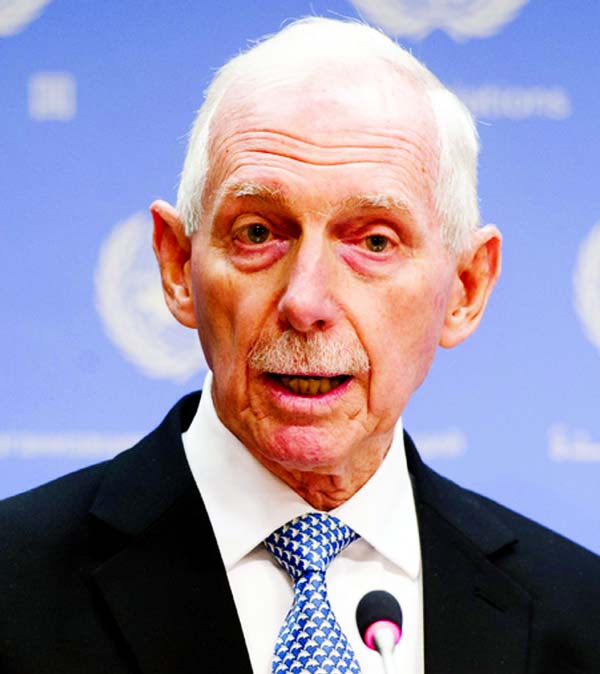
Special Correspondent :
International Organization for Migration [IOM] Director General William Lacy Swing arrived in Dhaka on Sunday on a four-day visit to see the condition of displaced Rohingyas staying in the camps at kutupalong and Balukhali.
“He has arrived in Dhaka Sunday afternoon and will leave Dhaka on Wednesday. He will visit Cox’s Bazar today,” Shirin Akhter, an official of Bangladesh IOM
office, told The New Nation.
The IOM DG during his visit is expected to meet Prime Minister Sheikh Hasina and Foreign Minister AH Mahmood Ali, among others.
Meanwhile, the IOM has appealed to the international community for more relief and assistance for the displaced Rohingyas as the speed and scale of the influx has triggered a humanitarian emergency in Cox’s Bazar.
Officials said about three quarters of a million refugees now depend on humanitarian assistance for shelter, food, water, sanitation and other life-saving needs. Prior to the August influx, Cox’s Bazar was already hosting over 200,000 previously displaced Rohingya, placing the district’s infrastructure and basic services under immense strain.
IOM Bangladesh Chief of Mission Sarat Dash said: “The seriousness of the situation cannot be over-emphasized. These people are malnourished and there is insufficient access to clean water and sanitation in many of the spontaneous sites. They are highly vulnerable. They have fled conflict, experienced severe trauma and are now living in extremely difficult conditions.”
There is tremendous pressure on the existing settlements, with the population of multiple sites and settlements more than doubling since August 25. This has resulted in a huge need site management for an estimated 700,000 people. This will cost an estimated USD 65 million, according to ISCG site management agencies.
Different organizations, including IOM said some 35,000 Rohingyas crossed into Bangladesh from Myanmar, bringing the total arrivals since August 25 to over 556,000. In this backdrop, the IOM appeals for more relief and assistance for the displaced Rohingyas.
“The risk of an outbreak of communicable disease is very high given the crowded living conditions and the lack of adequate clean water and sanitation. Maternal, newborn and child health care are also in desperately short supply given the very high numbers of pregnant or lactating women and children among the new arrivals,” said IOM Senior Regional Health Officer Patrick Duigan.
According to the IOM-hosted Inter Sector Coordination Group [ISCG] of aid agencies, the number of displaced Rohingyas spiked again this week when some 15,000 Rohingya crossed into Bangladesh between 9-11 October.
Earlier, last week ISCG aid agencies appealed for USD 434 million as part of a 6-month Humanitarian Response Plan targeting 1.2 million people including the Rohingya refugees.
Many of the new arrivals require immediate health assistance and agencies have appealed for USD 48 million to scale up primary health care in all the new settlements over the next six months.
International Organization for Migration [IOM] Director General William Lacy Swing arrived in Dhaka on Sunday on a four-day visit to see the condition of displaced Rohingyas staying in the camps at kutupalong and Balukhali.
“He has arrived in Dhaka Sunday afternoon and will leave Dhaka on Wednesday. He will visit Cox’s Bazar today,” Shirin Akhter, an official of Bangladesh IOM
office, told The New Nation.
The IOM DG during his visit is expected to meet Prime Minister Sheikh Hasina and Foreign Minister AH Mahmood Ali, among others.
Meanwhile, the IOM has appealed to the international community for more relief and assistance for the displaced Rohingyas as the speed and scale of the influx has triggered a humanitarian emergency in Cox’s Bazar.
Officials said about three quarters of a million refugees now depend on humanitarian assistance for shelter, food, water, sanitation and other life-saving needs. Prior to the August influx, Cox’s Bazar was already hosting over 200,000 previously displaced Rohingya, placing the district’s infrastructure and basic services under immense strain.
IOM Bangladesh Chief of Mission Sarat Dash said: “The seriousness of the situation cannot be over-emphasized. These people are malnourished and there is insufficient access to clean water and sanitation in many of the spontaneous sites. They are highly vulnerable. They have fled conflict, experienced severe trauma and are now living in extremely difficult conditions.”
There is tremendous pressure on the existing settlements, with the population of multiple sites and settlements more than doubling since August 25. This has resulted in a huge need site management for an estimated 700,000 people. This will cost an estimated USD 65 million, according to ISCG site management agencies.
Different organizations, including IOM said some 35,000 Rohingyas crossed into Bangladesh from Myanmar, bringing the total arrivals since August 25 to over 556,000. In this backdrop, the IOM appeals for more relief and assistance for the displaced Rohingyas.
“The risk of an outbreak of communicable disease is very high given the crowded living conditions and the lack of adequate clean water and sanitation. Maternal, newborn and child health care are also in desperately short supply given the very high numbers of pregnant or lactating women and children among the new arrivals,” said IOM Senior Regional Health Officer Patrick Duigan.
According to the IOM-hosted Inter Sector Coordination Group [ISCG] of aid agencies, the number of displaced Rohingyas spiked again this week when some 15,000 Rohingya crossed into Bangladesh between 9-11 October.
Earlier, last week ISCG aid agencies appealed for USD 434 million as part of a 6-month Humanitarian Response Plan targeting 1.2 million people including the Rohingya refugees.
Many of the new arrivals require immediate health assistance and agencies have appealed for USD 48 million to scale up primary health care in all the new settlements over the next six months.

